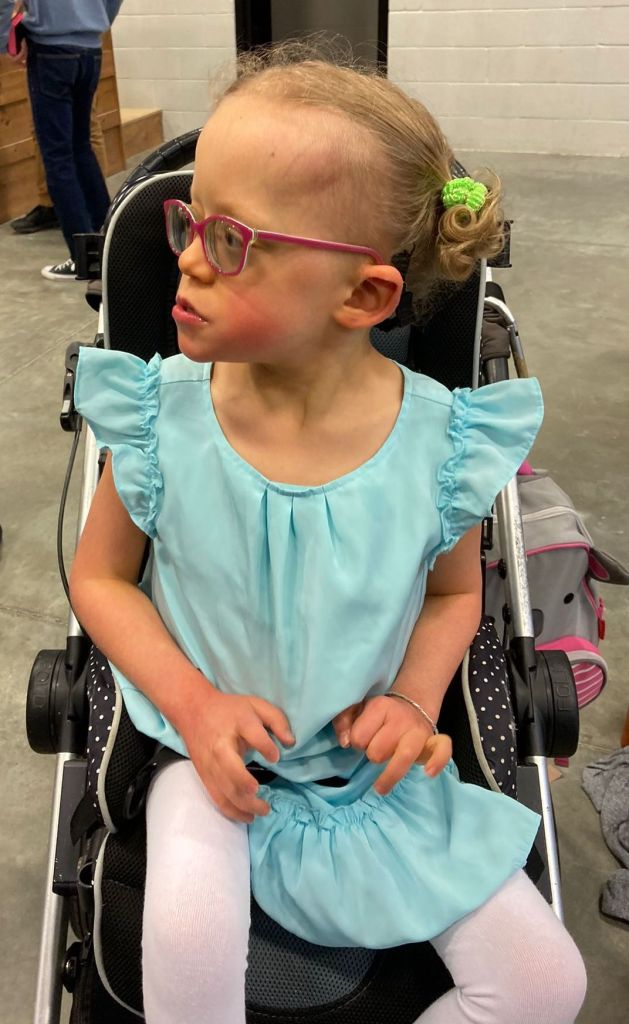I would like to introduce you to my niece. Say hello to Mary.
Mary is six and a half years old and was born with a very rare genetic disorder called CardioFacioCutaneous Syndrome (CFC). Don’t worry if you have never heard of it. According to one estimate, there are fewer than 500 known cases in the USA. People born with this genetic mutation have a variety of symptoms in different combinations, each to greater or lesser degrees. “Cardio” means it could affect their heart. “Facio” means it often affects muscles and development. “Cutaneous” means it usually affects their skin and hair. All of the people born with CFC have moderate to severe developmental delays. Given that the sample size for the disorder is extremely small and it has only been studied since 1986, there is far more unknown about it than known. If you are curious about the medical details, you can read up on it here and here.
It’s obvious to anyone with eyes and ears that Mary is different from her siblings. She doesn’t walk. She doesn’t talk. She doesn’t eat. That is NOT, however, to say that she doesn’t get around or communicate or receive nutrition. She definitely moves. If you are playing any kind of game on the living room carpet, beware! Mary is coming for you. She will sit and scoot herself across the room to join the fun. Her favorite version of any game is “shuffle and toss”: shuffle up whatever is in front of you and toss it in the air. Oh, how she chuckles at her silly self! Tissue boxes don’t stand a chance. Neatly folded laundry is doomed. Baskets of things exist to be emptied. Her family knows her mischievous sense of humor well. And though she doesn’t talk with words (apart from recently learning how to say “hello”), she most definitely has opinions. Sometimes she guides your hand to play a game or show you how to do something, sometimes she uses sign language, and when both of those don’t work, her hearty bellow makes her will known. As for nutrition, food and water are delivered directly to her belly through a detachable tube system. Think of the blow-up valve on a beach ball. She had one inserted in her stomach when she was 6 months old. Ever since then, she “eats” her meals by sitting in a high chair and playing games or looking at books while the nutrition is delivered drop by drop into her system.
What is Mary’s developmental potential? Will she ever learn to talk? To walk? To eat using her lips and teeth and tongue? We don’t know. Some kids with this syndrome do grow into these things. Others don’t. Where does Mary fall in that group? We don’t know. We only know that it will never happen without active and attentive care. In hope and love, her parents persistently pursue a number of therapies: occupational, physical, and speech. In hope and love, they take her to the hospital every six weeks for an 8-10 hour immunoglobulin transfusion therapy (IVIg) to boost her immune system. In hope and love, they read to her and play with her; hug her and kiss her; talk to her in English and “talk” to her in her own special monosyllabic speak.
I have been thinking lately about what it means to love people who cannot love you in the way that you want or expect. While loving someone like Mary has physical, mental, and emotional challenges, there is one level at least on which it is easy: you have no reason to expect anything in return. In clearly seeing her limits, you are free to give without getting. How much harder it is to be free with love when we have an expectation of the other person — when we believe that what another person ought to give and what they can give are the same.
I want to be careful here because I’m not implying that the standard should be diluted. The “ought-ness” of love is essential. We learn what love is specifically so that we might achieve it. The inability to achieve a standard is no reason to deny or reject the standard. However, it is also not a reason to reject the one who fails.
In a whole and healthy world, Mary would learn and grow into a reciprocal relationship. She would smile and hug you when she sees you, she would say sorry when she makes you mad, remember your birthday, or draw you a picture just because she felt like it. But people like Mary remind us that the world is not whole and healthy — that some people (or all people) simply cannot give back anything remotely close to what they receive. That reality doesn’t make them less in need of love. So much the opposite! They need abundantly more.
If it is true of people like Mary, is it not also true of the apparently “normal” people I find so hard to love? If I could know their true (invisible) limitations, would I be more free with my love? Am I willing to be free with my love even when I don’t know whether or not they can ever return it? Does not their inability mean that they too need abundantly more? I know it is true of me. How little I am able to love others the way I ought, and how much more deeply I need love in order to bridge that gap.
The deepest longing of every human heart is to be fully known and fully loved. For where there is love, there is always hope.
Freely you have received; freely give.
Matthew 10:8


Leave a reply to Tim Kaler Cancel reply